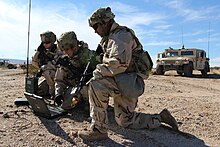
Back Kuberoorlogvoering AF حرب سيبرانية Arabic Kibermüharibə AZ Кибервойна Bulgarian Guerra informàtica Catalan شەڕی سایبێری CKB Hackerský útok Czech Cyberkrig Danish Cyberkrieg German Cibermilito EO

| Part of a series on |
| War (outline) |
|---|
 |
Cyberwarfare is the use of cyber attacks against an enemy state, causing comparable harm to actual warfare and/or disrupting vital computer systems.[1] Some intended outcomes could be espionage, sabotage, propaganda, manipulation or economic warfare.
There is significant debate among experts regarding the definition of cyberwarfare, and even if such a thing exists.[2] One view is that the term is a misnomer since no cyber attacks to date could be described as a war.[3] An alternative view is that it is a suitable label for cyber attacks which cause physical damage to people and objects in the real world.[4]
Many countries, including the United States, United Kingdom, Russia, China, Israel, Iran, and North Korea,[5][6][7][8] have active cyber capabilities for offensive and defensive operations. As states explore the use of cyber operations and combine capabilities, the likelihood of physical confrontation and violence playing out as a result of, or part of, a cyber operation is increased. However, meeting the scale and protracted nature of war is unlikely, thus ambiguity remains.[9]
The first instance of kinetic military action used in response to a cyber-attack resulting in the loss of human life was observed on 5 May 2019, when the Israel Defense Forces targeted and destroyed a building associated with an ongoing cyber-attack.[10][11]
- ^ Singer, P. W.; Friedman, Allan (March 2014). Cybersecurity and cyberwar: what everyone needs to know. Oxford University Press. ISBN 978-0-19-991809-6. OCLC 802324804.
- ^ "Cyberwar – does it exist?". NATO. 13 June 2019. Retrieved 10 May 2019.
- ^ Smith, Troy E. (2013). "Cyber Warfare: A Misrepresentation of the True Cyber Threat". American Intelligence Journal. 31 (1): 82–85. ISSN 0883-072X. JSTOR 26202046.
- ^ Lucas, George (2017). Ethics and Cyber Warfare: The Quest for Responsible Security in the Age of Digital Warfare. Oxford University Press. p. 6. ISBN 978-0-19-027652-2.
- ^ "Advanced Persistent Threat Groups". FireEye. Retrieved 10 May 2019.
- ^ "APT trends report Q1 2019". securelist.com. 30 April 2019. Retrieved 10 May 2019.
- ^ "GCHQ". www.gchq.gov.uk. Retrieved 10 May 2019.
- ^ "Who are the cyberwar superpowers?". World Economic Forum. 4 May 2016. Retrieved 24 June 2021.
- ^ Green, James A., ed. (7 November 2016). Cyber warfare: a multidisciplinary analysis. London: Routledge. ISBN 978-0-415-78707-9. OCLC 980939904.
- ^ Newman, Lily Hay (6 May 2019). "What Israel's Strike on Hamas Hackers Means For Cyberwar". Wired. ISSN 1059-1028. Retrieved 10 May 2019.
- ^ Liptak, Andrew (5 May 2019). "Israel launched an airstrike in response to a Hamas cyberattack". The Verge. Retrieved 10 May 2019.